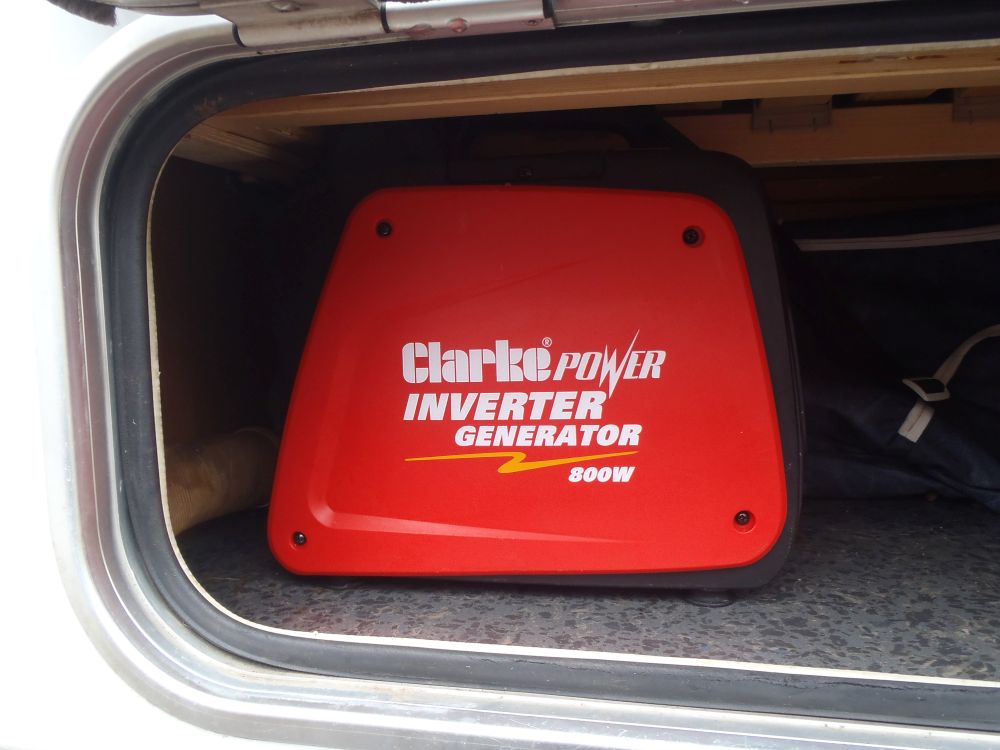‘Wild camping?’- This is what you need (in our humble opinion)
Generator Review – If you are going to spend considerable amounts of time ‘Wild camping’ your are going to need some way of re-charging your 12v batteries – while solar can be a good solution in the summer we needed something to support winter use in the mountains, where the sun is often too low to reach down into the valleys even on cloudless days!
For this we needed a generator, so we looked for one with the following functions:-
- Four Stoke (easier to start and less noxious exhaust than 2-stroke units)
- Inverter output (cleaner electrical output, better for sensitive electronics)
- Quiet running (so as not to upset the neighbours on busier sites!)
- Compact and lightweight (to not take up too much precious space and payload in the van)
After researching the options we settled on the Clarke IG950 800w generator:-

It’s very easy to use, fairly quiet when running and lightweight at just 9.3kg. It runs off standard unleaded fuel and consumes just 0.54 litres per kwh of electricity generated. It also has an eco-throttle mode that slows the engine to reduce noise and fuel consumption at low load and automatic shut down for overload or low oil conditions. There is even a 12v DC output that can be used to charge batteries directly (useful if you need to start a car with a flat battery, also provides an emergency option if your on-board 230v battery charger fails!)
There is a valve on the petrol cap so there are no petrol fumes when it is in storage.
Most importantly it is small so fits neatly in the side locker under the seats in our van (4-stroke generators need to be stored upright and we don’t have a garage on our van to store large items)

It is tempting to buy a large generator to be able to power large appliances, but realistically we can run everything we need of the 12v batteries and 1500w inverter (see other post here) so anything larger just adds size, weight and cost. The 800w output is plenty for us (the on-board battery charger takes a couple of hundred watts max even when the batteries are completely flat)
There are quieter units on the market (the best competitor is probably the Honda EU10i), but the Clarke is reasonably quiet and we couldn’t justify the £1000ish cost of the Honda vs £260 for the Clarke!. We’ve been totally happy with our little generator and would recommend it to anyone in a similar situation.
Update! – I’ve also found this generator on Amazon – I’ve got no experience with it but it appears to be exactly the same unit as the Clarke generator (I would bet it comes off the same production line!) but at a lower cost:-
For completeness – here are the Honda units if cost is not an issue and you want the best!:-


October 23, 2018 at 7:30 pm
Generators are a great thing to have in off the beaten track situations. You just know that you can charge a battery to get the car going or even work a power tool, should you need it. Another worthwhile bit of kit in the armoury of the independent traveller.
I have the ancient and very quiet Honda EX 650. I think Inverter types Like that Clarke are better for digital and computer devices mind.
December 31, 2022 at 11:53 am
“The 800w output is plenty for us (the on-board battery charger takes a couple of hundred watts max even when the batteries are completely flat)”
Thanks, super useful to read your experience. Out of interest roughly how long would it take for the generator to fully recharge say a 80aH leisure battery? Is my maths right that 80aH = 1kWh, so if the battery is taking say 200 watts from the generator then we’re talking roughly five hours?
January 5, 2023 at 8:24 am
Hi Steve, thanks for the comment. The easiest way of thinking about it is to look at the charging current from your charger. For example my Elektroblock EBL 4-105 (factory fitted in our Hymer) has a 10A charger (so allowing for efficiency probably 150W-200W input power). This would charge an 80Ah battery in 80Ah/10A = 8 hours. This is a very simplified way of looking at it doesn’t take into account things like charging efficiency, the fact the charge rate will drop off as the battery approaches fully charged or the fact that you would likely never “fully” discharge your leisure battery but it will get you in the right ball park! Hope this helps, Cheers, Dan